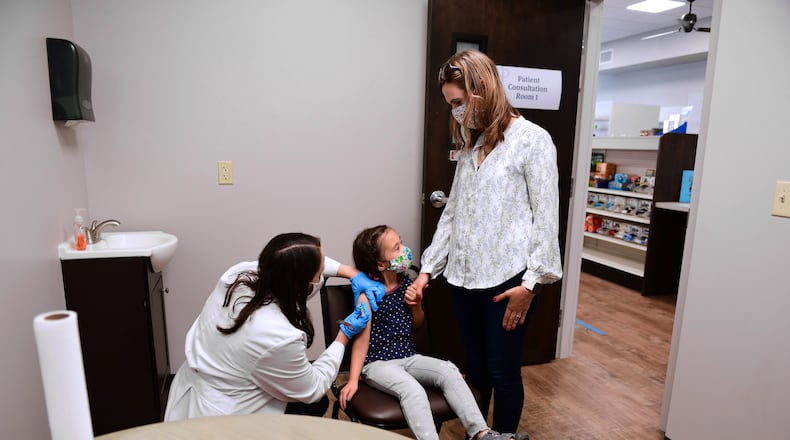According to the CDC, the exact timing and durations of flu seasons can vary, but influenza activity begins to increase in October.
“Getting vaccinated in July or August is too early, especially for older people, because of the likelihood of reduced protection against flu infection later in the flu season,” Patricia Free, nursing supervisor at the Clark County Combined Health District said. “September and October are good times to get vaccinated. However, as long as flu viruses are circulating, vaccination should continue, even in January or later.”
“In the midst of the current pandemic with COVID-19, it is even more important to receive your flu vaccine this year,” Dr. Lisa Ziemnik, division chief of Dayton Children’s Kids Express and urgent care, said in a statement.
Ziemnik said many of the symptoms of COVID-19 in children are similar to the flu, especially the early signs, like fever.
“Once fever hits, we don’t know if it is flu, COVID or another virus. Having the flu vaccine helps to decrease the likelihood that it is flu and helps us, as physicians, to best take care of each individual and overall keep more children healthy,” Ziemnik said.
Free said that getting a flu shot not only reduces the chance of contracting influenza, but also decreases the burden of influenza illness, physician visits and hospitalizations and even deaths associated with influenza and helps to save resources.
“It is possible to have flu and other respiratory illnesses and COVID-19 at the same time,” Free added.
To get your child’s flu vaccine, parents have several options. The Clark County Combined Health District recommends contacting the child’s primary care providers including family physicians and pediatricians.
Children 6 months and older can also go to the Clark County Combined Health District for flu vaccines with a scheduled appointment. Appointments are available 7:30 a.m. to 5 p.m. Monday, Wednesday and Friday at 529 E. Home Rd. in Springfield or on Tuesdays at 1209-3 Sunset Ave. in Springfield.
The seasonal flu can not only lead to illness but can also lead to hospitalizations and deaths. Nationally, the total number of child flu deaths reported to CDC for last season was 188, though the agency estimates the actual number is likely higher.
For the 2019-2020 season, only 21% of children eligible for vaccination were fully vaccinated against flu, according to the CDC.
CDC recommends everyone 6 months and older get an annual flu vaccine, especially children who are younger than 5 years of age or children of any age who have a high risk medical condition, because they are more likely to develop serious flu complications that can lead to hospitalization and death.
Getting vaccinated has been shown to reduce flu illnesses, doctor’s visits, missed school days, and reduce the risk of flu-related hospitalization and death in children.

